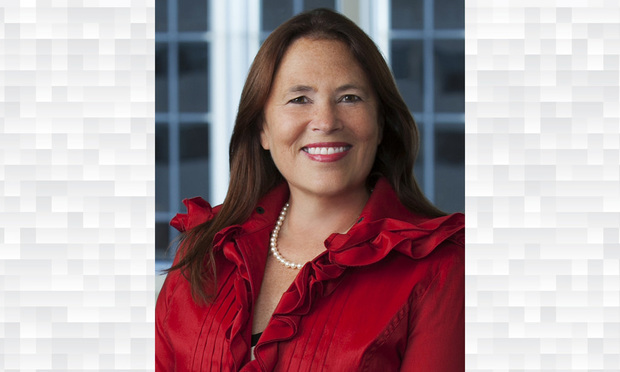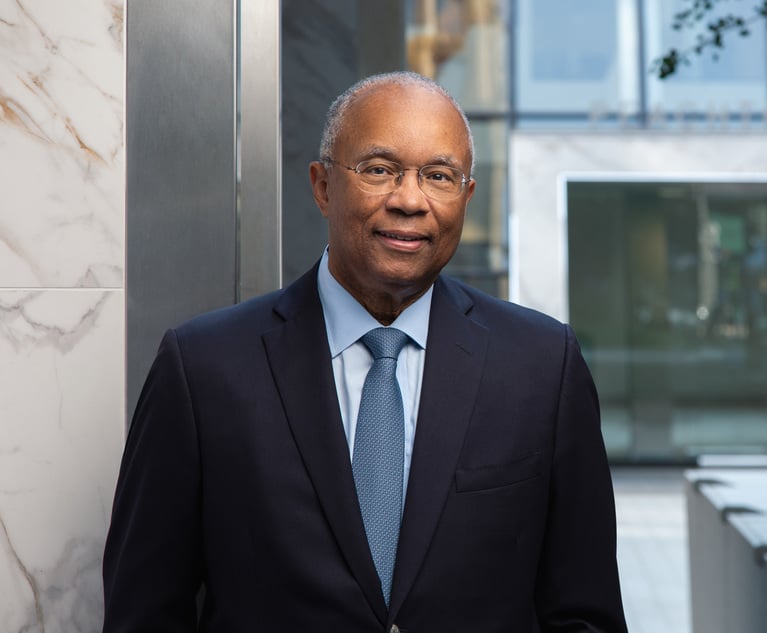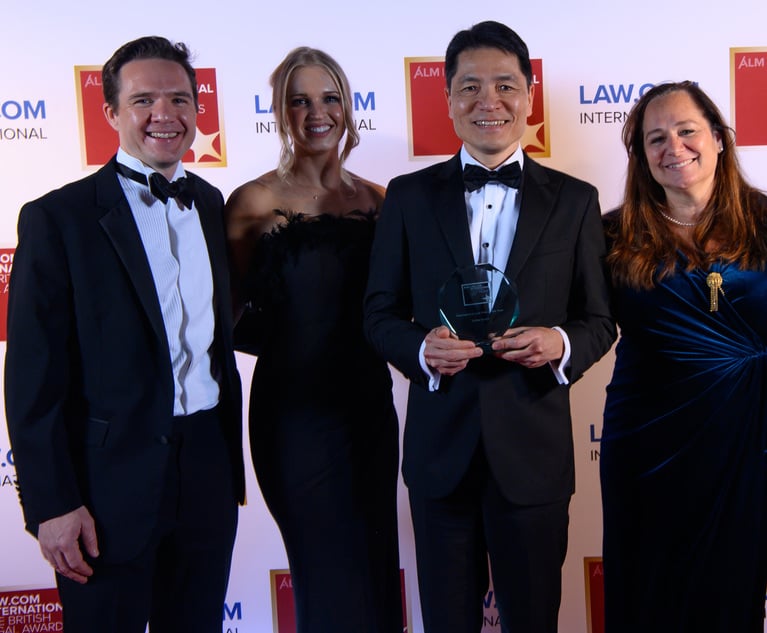Q&A: Jami Wintz McKeon on Succeeding by Being Yourself
Morgan, Lewis & Bockius' chair weighs in on the practices that helped her rise to the top of her firm.
March 02, 2018 at 05:56 PM
7 minute read

Editor's note: This is part of a series of Q&As with leading women in the legal profession, in honor of National Women's History Month. They were conducted and written by the legal recruiting firm Major, Lindsey & Africa.
Jami Wintz McKeon, chair of Morgan, Lewis & Bockius, took a very linear path in her legal career, going straight from college to law school to working at the firm starting in 1981. She has held various management positions, including membership on the firm's advisory board. Immediately prior to assuming the chair, she led Morgan Lewis' litigation practice, the firm's largest group. “I've had two jobs in my life—lifeguard and Morgan Lewis lawyer,” she says.
Who helped you the most on your career path?
I don't agree with the philosophy that “you have to see it to be it,” because there wasn't much for me to see to be. A number of different people influenced my career. Many were men, some old-fashioned men. I also had peers who were mentors. As an associate, I worked for every partner in the litigation group at that time, and each one gave me an opportunity and supported my success. I had women partners along the way who were more like peers—Pam Daley, who left the firm to become a senior leader at GE, was someone who was a mentor not because she was a woman but because she was heavily involved in recruiting like I was. Fran Milone, the previous chair, was a mentor. There were judges I tried cases in front of who encouraged me. Many—not just one—influenced my career.
Were there any moments early in your career that surprised you in terms of how you were treated? What struggles did you encounter and how did you overcome those roadblocks in your career?
There were struggles, but I think there is a balance, as I also had opportunities because I am a woman. There is no question that when I started practicing, there were people who really were not accustomed to young women being lawyers. I became a lawyer around the time it became improper to ask women if they were going to get married and have kids, but I was asked how I could be a good lawyer and good mother. When I became pregnant, there were not many women at the firm and there was no formal maternity policy. The managing partner asked me what a reasonable policy would be. We agreed to three months, and Morgan Lewis implemented that. I went out and came back; people were thrilled to have me back. I never experienced any difficulty from that because at that time everyone's expectation was that you were going to come back to work. I had lots of support, and I didn't miss a beat.
Now, as a litigator, there were judges who weren't great with women. One once told me he liked to make women cry, and when I didn't buckle under and was effective and successful in front of him, he never gave me a hard time again. I also had opposing counsel who were obnoxious and dismissive—though they were often not paying a lot of attention and missed that I was doing things to dismantle their case.
If I could get past an initial issue, there was a flip side to it for a positive opportunity. There were lots of committees at the firm that wanted women to participate, so I got to do a lot of things my male counterparts weren't able to. I didn't have to be like anyone else because I wasn't. I got to carve my own path because it wasn't an option to be just like one of the guys.
There was advice out there to not have pictures of kids in your office or talk about women hobbies, but you have to be yourself and authentic. My kids came to the office with me on the weekends, and I had pictures they drew on the walls. I wore dresses and skirts because that's what I liked to wear; I talked about cooking and brought food in. I brought diversity to the table when people weren't talking about that word. Having people who are different from each other just makes life more interesting, and I benefited from the fact that I didn't fit into a particular model. And I'm not sure I would have done quite as well if I had tried to.
What has been your greatest challenge as the chair of Morgan Lewis? What keeps you up at night?
I've always been very focused and engaged with the firm and always had a sense of responsibility, but as chair, everything keeps you up at night. I think everything we do is about relationships. The bigger your group is the more relationships there are to pay attention to. For me, it's staying on top of what's going on in people's lives and careers and communicating with everyone so they understand that everyone is important. I think communicating effectively throughout the organization so that everyone is rowing in the same direction is a challenge. Size is a competitive advantage if you get everything else right—consistent high-quality work; exceptional client service; well-integrated, collaborative culture; and a culture where everyone recognizes no limit to what you can achieve if you don't care who gets the credit. The focus on strategic things and work at a top level and winning talent are critically important, but you are more likely to be successful in all those things if you are successful in communicating and building relationships.
How important is it to your law firm to have women in leadership?
Diversity is important in everything that anyone does. If Morgan Lewis was all women, I would say that it's important to have men in leadership. More diverse organizations perform better because diversity of ideas leads to better results. If you get five people in a room with exactly the same everything, you are likely going to get a fairly homogeneous reaction. If you throw someone into that room with a life that is extremely different from any existing perspective, you are going to bring in a different aspect to that decision. Women are important because law firms are traditionally male dominated but also because clients expect us to reflect them and their customer base. Groups who are more diverse get better results.
How do you or your organization help women advance in the workplace and the legal profession?
We have a lot of diversity initiatives. We signed on to the Mansfield rule, which requires that 30 percent of the candidates we consider for leadership positions and later recruit to be diverse; that was a no-brainer, as we do that already. I appoint virtually all of the leadership in the firm; only two groups are elected (the advisory board and the compensation committee). I have the ability to make selections for our positions that allow us to diversify and shrink gaps. We also have the Morgan Lewis women business development-focused initiative, where we work with men and women to help advance women in the practice and help women work with our clients.
I'm personally involved in lots of organizations where I'm out there trying to support women—whether mentoring, speaking at events or simply supporting women who have reached out for advice.
What advice would you give to young lawyers who desire to become a partner in a law firm?
This is a great profession for everyone—women, people with children—because there is a lot of autonomy and flexibility. In recent years, it's become fashionable to act like you don't want to become partner. You should want to become a partner; it's a great thing to do. You should go for that.
Focus on being truly outstanding, meaning being completely engaged, giving 150 percent, being energized in what you are doing and at the same time being authentic and finding a way to stand out in your profession. It's much harder trying to be someone else. Bring your whole self, your best self to the job—that's the best recipe for success.
This content has been archived. It is available through our partners, LexisNexis® and Bloomberg Law.
To view this content, please continue to their sites.
Not a Lexis Subscriber?
Subscribe Now
Not a Bloomberg Law Subscriber?
Subscribe Now
NOT FOR REPRINT
© 2025 ALM Global, LLC, All Rights Reserved. Request academic re-use from www.copyright.com. All other uses, submit a request to [email protected]. For more information visit Asset & Logo Licensing.
You Might Like
View All
Zuckerman Spaeder Gets Ready to Move Offices in DC, Deploy AI Tools in 2025
5 minute read
Ex-Deputy AG Trusts U.S. Legal System To Pull Country Through Times of Duress
7 minute read
Legal Recruiter Amy Savage Joins Garrison as Lateral Gov't Moves Stay Busy
6 minute readTrending Stories
- 1'It's Not Going to Be Pretty': PayPal, Capital One Face Novel Class Actions Over 'Poaching' Commissions Owed Influencers
- 211th Circuit Rejects Trump's Emergency Request as DOJ Prepares to Release Special Counsel's Final Report
- 3Supreme Court Takes Up Challenge to ACA Task Force
- 4'Tragedy of Unspeakable Proportions:' Could Edison, DWP, Face Lawsuits Over LA Wildfires?
- 5Meta Pulls Plug on DEI Programs
Who Got The Work
Michael G. Bongiorno, Andrew Scott Dulberg and Elizabeth E. Driscoll from Wilmer Cutler Pickering Hale and Dorr have stepped in to represent Symbotic Inc., an A.I.-enabled technology platform that focuses on increasing supply chain efficiency, and other defendants in a pending shareholder derivative lawsuit. The case, filed Oct. 2 in Massachusetts District Court by the Brown Law Firm on behalf of Stephen Austen, accuses certain officers and directors of misleading investors in regard to Symbotic's potential for margin growth by failing to disclose that the company was not equipped to timely deploy its systems or manage expenses through project delays. The case, assigned to U.S. District Judge Nathaniel M. Gorton, is 1:24-cv-12522, Austen v. Cohen et al.
Who Got The Work
Edmund Polubinski and Marie Killmond of Davis Polk & Wardwell have entered appearances for data platform software development company MongoDB and other defendants in a pending shareholder derivative lawsuit. The action, filed Oct. 7 in New York Southern District Court by the Brown Law Firm, accuses the company's directors and/or officers of falsely expressing confidence in the company’s restructuring of its sales incentive plan and downplaying the severity of decreases in its upfront commitments. The case is 1:24-cv-07594, Roy v. Ittycheria et al.
Who Got The Work
Amy O. Bruchs and Kurt F. Ellison of Michael Best & Friedrich have entered appearances for Epic Systems Corp. in a pending employment discrimination lawsuit. The suit was filed Sept. 7 in Wisconsin Western District Court by Levine Eisberner LLC and Siri & Glimstad on behalf of a project manager who claims that he was wrongfully terminated after applying for a religious exemption to the defendant's COVID-19 vaccine mandate. The case, assigned to U.S. Magistrate Judge Anita Marie Boor, is 3:24-cv-00630, Secker, Nathan v. Epic Systems Corporation.
Who Got The Work
David X. Sullivan, Thomas J. Finn and Gregory A. Hall from McCarter & English have entered appearances for Sunrun Installation Services in a pending civil rights lawsuit. The complaint was filed Sept. 4 in Connecticut District Court by attorney Robert M. Berke on behalf of former employee George Edward Steins, who was arrested and charged with employing an unregistered home improvement salesperson. The complaint alleges that had Sunrun informed the Connecticut Department of Consumer Protection that the plaintiff's employment had ended in 2017 and that he no longer held Sunrun's home improvement contractor license, he would not have been hit with charges, which were dismissed in May 2024. The case, assigned to U.S. District Judge Jeffrey A. Meyer, is 3:24-cv-01423, Steins v. Sunrun, Inc. et al.
Who Got The Work
Greenberg Traurig shareholder Joshua L. Raskin has entered an appearance for boohoo.com UK Ltd. in a pending patent infringement lawsuit. The suit, filed Sept. 3 in Texas Eastern District Court by Rozier Hardt McDonough on behalf of Alto Dynamics, asserts five patents related to an online shopping platform. The case, assigned to U.S. District Judge Rodney Gilstrap, is 2:24-cv-00719, Alto Dynamics, LLC v. boohoo.com UK Limited.
Featured Firms
Law Offices of Gary Martin Hays & Associates, P.C.
(470) 294-1674
Law Offices of Mark E. Salomone
(857) 444-6468
Smith & Hassler
(713) 739-1250











